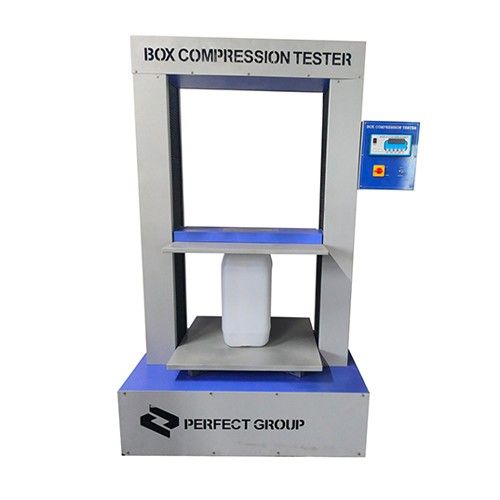-Capacity: 10KN/1000Kgf (other on customer request).
-Readability: 1N/0.1Kgf (other on customer request).
-Accuracy: ±0.5%.
-Platform sizes: 600mmX600mm/ 1000mmX1000mm (other on request).
-Test speed: 12.5±2.5 mm/minute.
-Self-calibration facility.
-As per standard ISO12048, ASTM D4169, ASTM D642.
*Computerised & Touch screen models also available.
We manufacture premium quality box compression tester to test boxes before such are put into use for carrying goods and in transportation. We have set up a world-class manufacturing unit to design and develop prime box compression testers to help companies test their boxes before supplying them to other businesses.
The carton or box compression test is useful to test the strength of a box to bear any real-time pressure that it would face when it would carry goods in it.
For such a purpose, specific apparatus is placed which acts as a weight simulator and it is checked that the box doesn’t get crushed.
Some people also call this “package compression test” “container compression test” and box compression test.
Our engineers keep different aspects into consideration while designing box compression testers so that any possible harsh situation could be tested and checked through. For more insights and details just contact us right away.
A box compression tester is a testing device used to measure the compressive strength of a box or container. It is typically used to test the strength of packaging materials, such as corrugated cardboard boxes, to determine how much weight they can withstand before they collapse. In this article, we will explore the advantages and disadvantages of box compression testing to help answer the question of whether or not a box compression tester is worth buying.
Advantages of Box Compression Testing
Quality Control
Box compression testing provides a reliable means of testing the compressive strength of a box or container. This is important for quality control, as it helps to ensure that the packaging materials meet the necessary standards and are able to withstand the stresses of shipping and handling.
Cost-Effective
Box compression testing is a cost-effective way to test the compressive strength of a box or container. It is less expensive than other forms of testing, such as field testing or computer simulations, and it can provide fast and accurate results.
Customizable
Box compression testing is a customizable testing method. It can be tailored to the specific needs of a product or industry. This means that a box compression tester can be designed to simulate the weight and pressure that a box or container may encounter in its intended use, allowing for more accurate testing and better results.
Reproducible
Box compression testing is a reproducible testing method. It is possible to repeat a box compression test multiple times and get consistent results. This is important for quality control and allows for the detection of even minor variations in a product's compressive strength.
Is a Box Compression Tester Worth Buying?
The decision to invest in a box compression tester will depend on a number of factors, including the needs of the company and the products being tested. In general, a box compression tester is a worthwhile investment for companies that produce products that are packaged in boxes or containers.
If a company requires a reliable and cost-effective means of testing the compressive strength of its packaging materials, a box compression tester may be the best choice. A box compression tester can provide consistent and accurate results and can be customized to simulate the weight and pressure that a box or container may encounter in its intended use.
However, if a company produces products that do not require packaging or that are unlikely to be subjected to compression, a box compression tester may not be necessary. It is important to evaluate the specific needs of the company and the products being tested before making a decision to invest in a box compression tester.
In conclusion, a box compression tester can provide a reliable and cost-effective means of testing the compressive strength of packaging materials

